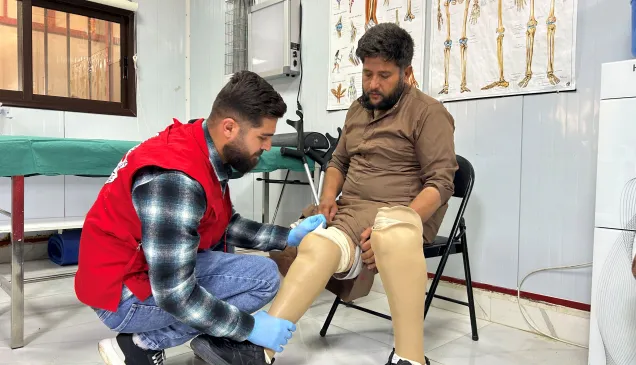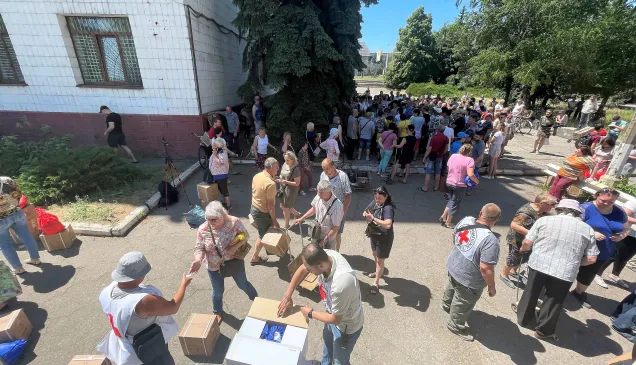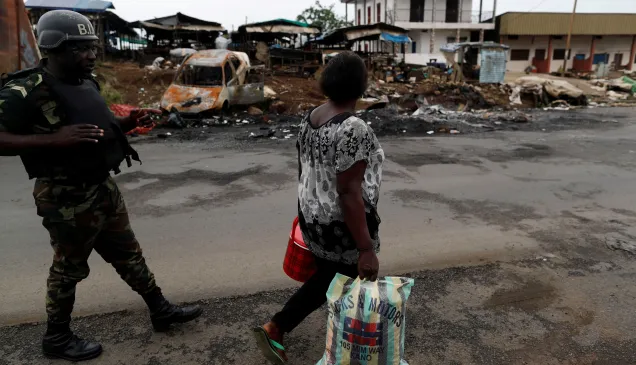Water workers preserve public health despite war and COVID-19
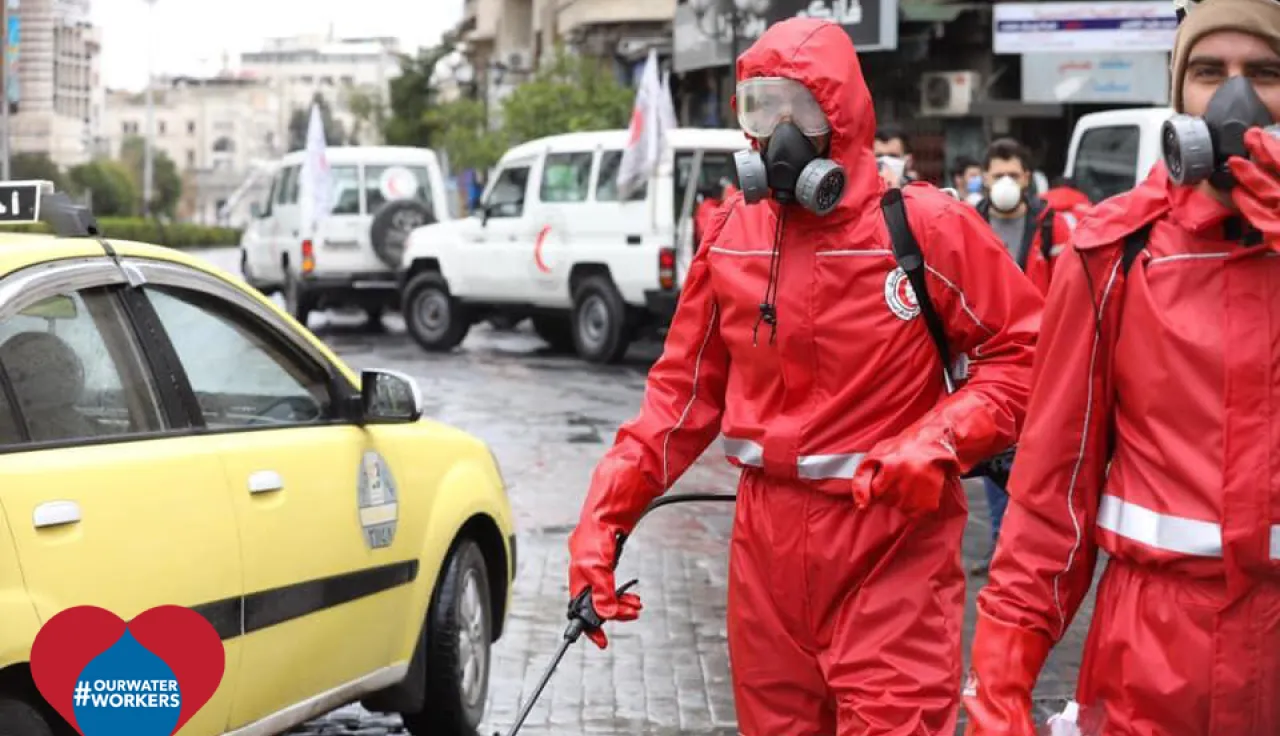
Water and sanitation personnel show extraordinary dedication in some of the most difficult of places – war zones. Their efforts go largely unrecognized, and now they face the additional burden of coronavirus. As a humanitarian organization, the ICRC pays tribute to these dedicated men and women - #OurWaterWorkers
Conflict in towns and cities frequently overwhelms health, water, sewerage and electricity services and destroys infrastructure. And COVID-19 can spread quickly in urban areas, making it still harder for local authorities and humanitarian organizations to respond. Water workers play a leading role in ensuring that people can protect their health, by supplying the water they need to keep themselves and their surroundings clean.
Water and war – not just broken pipes
We've all seen the pictures of pipelines and pumping stations destroyed by shells and bombs, but armed conflicts also have hidden consequences for water and sanitation, especially when they drag on for years. And protracted conflict leads to a brain-drain, with skilled staff heading for safer places. Equipment, chemicals and services become unobtainable.
Cities without water.
Homes without families.
Schools without students.
Patients without medicines.
Hospitals without electricity.
Neighbourhoods without people.
When wars are fought in cities, no-one wins. pic.twitter.com/t1owQwpB4D— ICRC (@ICRC) February 9, 2020
Pressure on utilities and consumers during public health emergencies
As with armed conflict, it is the direct impact of COVID-19 that has captured the world's attention. But the secondary impact is becoming increasingly apparent.
Restrictions on movement, difficulty obtaining or importing essential equipment, fuel and chemicals, rising prices for what supplies are still available... all these factors threaten essential services.
In some conflict areas, COVID-19 is robbing water and sewerage services of essential funds, as lost incomes leave households unable to pay their utility bills.
The consequences can be disastrous, with disruptions to the water supply in cities like Taiz and Maiduguri, endangering the health of millions.
These secondary effects not only threaten existing services but also halt the expansion of water and sewerage services to communities that lack them. During the COVID-19 pandemic, as always, the most vulnerable members of society are hardest hit – you can't wash your hands without water.
Ukraine: Supplying water across the front line
Voda Donbassa (Donbas Water) provides water and sewerage services to over 5 million people, delivering more than 1.3 billion cubic metres of water a day to 300 towns and communities in Donetsk Oblast, eastern Ukraine. Over 11,000 employees operate and maintain ageing, mainly Soviet-era infrastructure, including 18 filtration stations, 55 main pump stations, 130 km of canals and thousands of kilometres of pipeline.
Lack of funds for repairs and new infrastructure were already making it difficult to maintain essential services, and the conflict that has been rumbling on since 2014 has made things worse. Much of the essential infrastructure crosses the "line of contact" multiple times.
Shelling has damaged infrastructure, access to facilities in the conflict zone is difficult, materials and equipment for repairs are in short supply, and there is a shortage of funds to pay for operations. Despite all these obstacles, Voda Donbassa continues to ensure that people on both sides of the line have water.
This year, COVID-19 has added yet another layer of complexity to efforts to maintain services and to keep staff and the public safe.
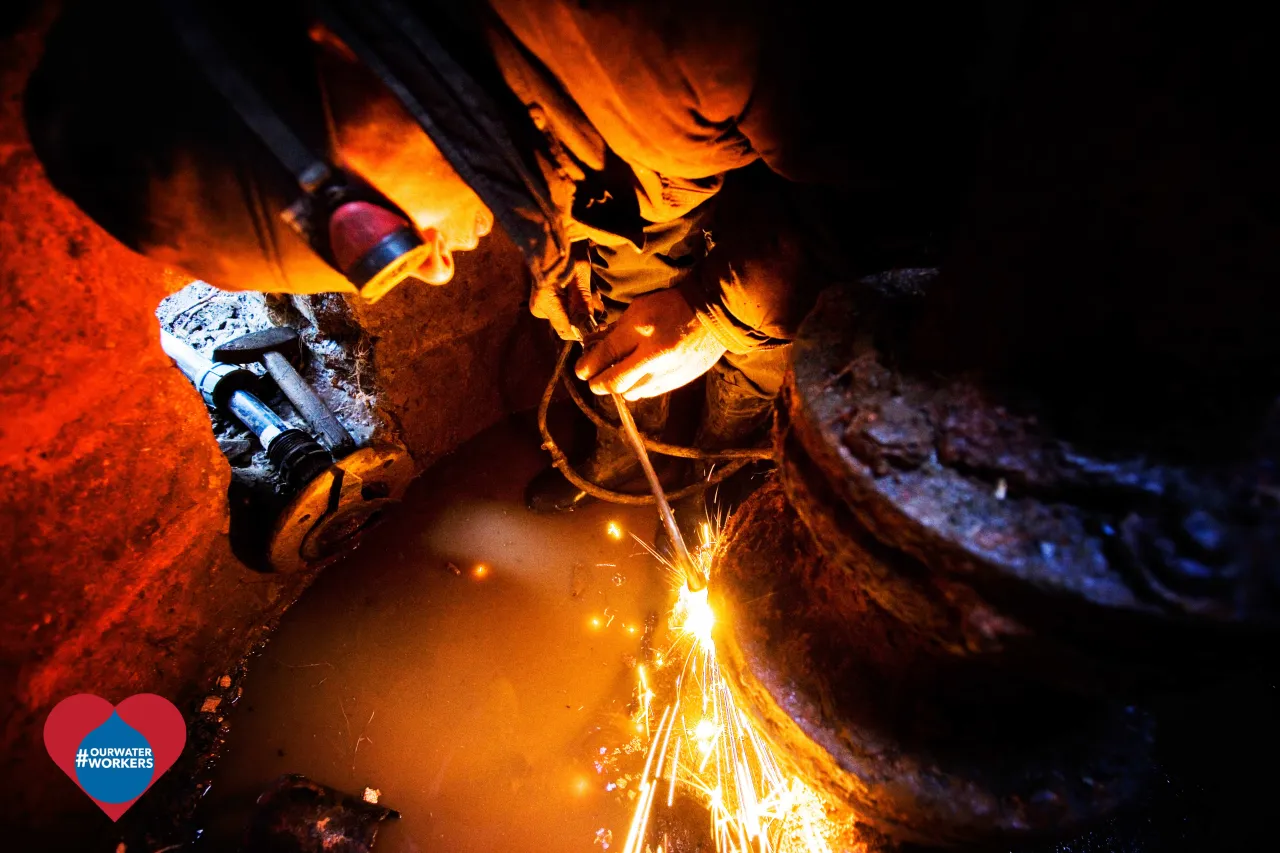
Over 11,000 employees operate and maintain ageing, mainly Soviet-era infrastructure, which spreads accross front lines. Pieter-Jan De PUE/ICRC
Victor Zavodovskiy is a director of investment at Voda Donbassa. "Quarantine restrictions make it impossible for repair teams to cross the line of contact, so teams and equipment have had to be duplicated to make repairs possible, increasing the strain on already limited resources," he said.
Transport and physical distancing are also difficult. "There's only limited secure transport to get workers to facilities near the front line, so they can't always observe physical distancing, and that puts them at risk," he added.
Syria: Teamwork ensures people get the water they need
The Syrian government's response to COVID-19 has slashed staff at the Water Board of Damascus and Rural Damascus (DAWSSA), to less than 5 per cent of the usual 4,000.
The remaining employees are subject to tight restrictions on their movements. This has hit maintenance, repairs and the distribution of water disinfection products, endangering water supply and hygiene in dense urban areas. Office staff are not equipped to work from home, making it difficult to control the complex water system under lockdown.
Supplying water for hygiene in locked-down areas such as Sayedeh Zeinab, Ras al-Muarra and Jdaidet al-Fadl is a top priority. In Dara'a and other towns in the south, water boards are doing their best to maintain operations despite COVID-19 restrictions and a deteriorating security environment.
To support the work of DAWSSA, Syrian Arab Red Crescent (SARC) volunteers are using ICRC-supplied equipment to disinfect public facilities, buildings and areas. Volunteers have also been promoting hygiene and public health in densely-populated areas and in vulnerable locations such as centres for internally displaced persons.
Together, the SARC and the ICRC refill over 300 tanks every day, supplying water to 300,000 people in Eastern Ghouta, and are disinfecting water trucking equipment and the areas around water tanks.
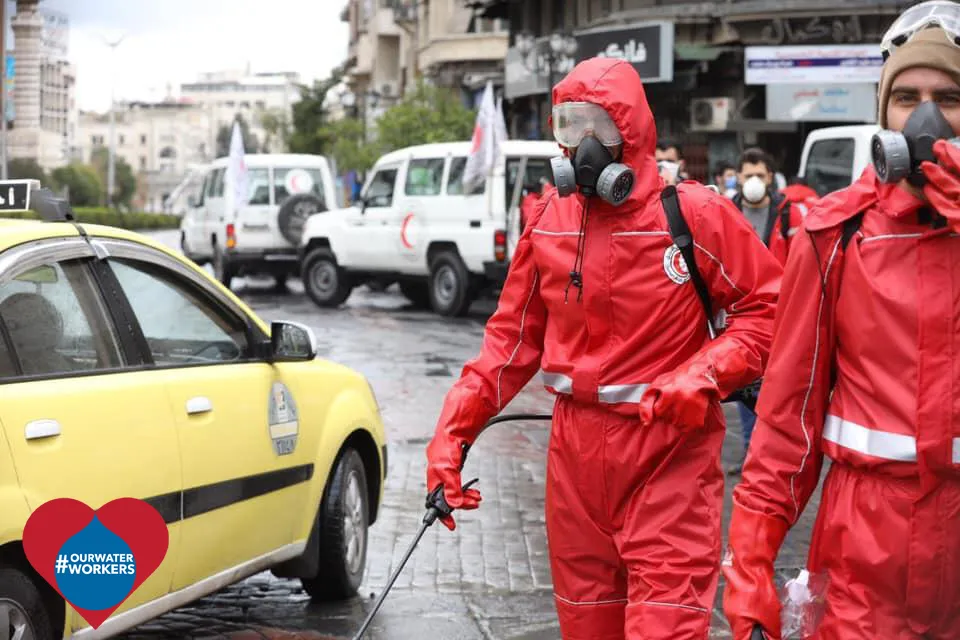
Syrian Arab red Crescent personnel carrying out a disinfection campaign in the streets of Damascus as part of the preventative measures against COVID-19. ICRC
Iraq: Keeping the water flowing in Mosul
Fighting in Mosul ended in late 2017, but the city is still recovering. Now, the Directorate of Water (DoW) faces the double challenge of restoring services and coping with COVID-19.
The director, Engineer Muaed, is having to make do with drastically reduced personnel. "We've managed to keep water treatment plants and pumping stations running 24 hours a day to ensure that people get clean water, but we're facing a 75% cut in employee working hours and a shortage of funds for routine operation and maintenance," he said. "And we still have to not only deliver our services but also sterilize all our production units and offices, to keep our staff and customers safe."
The DoW has distributed masks and gloves (donated by the ICRC and others) to its employees. The ICRC has donated food parcels for temporary staff in Mosul, who have received no pay for over six months. But despite the challenges, the DoW has built a pipeline that now delivers water to Mosul's new quarantine centre.
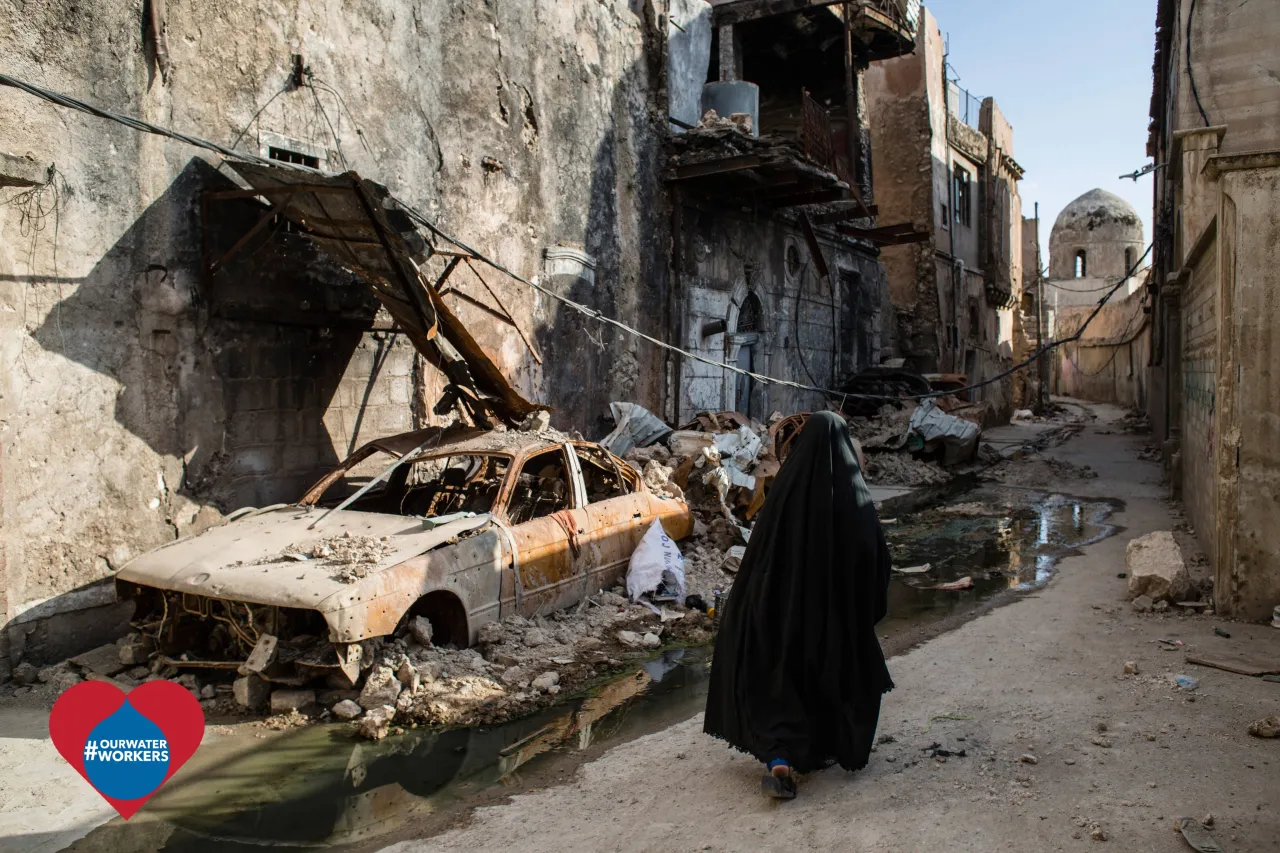
Fighting in Mosul heavily damaged water systems and other essential infrastructure. It will take years to rehabilitate them. Khalid HAWRE/ICRC
Central African Republic: Delivering clean water despite border closures and staff shortages
SODECA is the domestic water utility supplying homes in the Central African Republic (CAR). SODECA technical director Eric Megalos-Dima explains some of the challenges they face in responding to COVID-19. "To maintain water quality to WHO standards, we need certain chemicals. CAR doesn't produce those chemicals so we have to import them, mainly from Cameroon. But the border between Cameroon and CAR has been closed during the crisis, so getting hold of the chemicals has been a headache," he said.
SODECA has faced a fall in revenue because people could not travel to its offices to pay their water bills. Staff safety and wellbeing are also important. "Our staff are in direct contact with customers and with water," explains Megalos-Dima. "So they risk being contaminated by the virus. We can't provide COVID-19 tests for them, so some didn't come to work because they were afraid, others because they had symptoms and didn't want to spread the disease. This reduced our capacity to provide services."
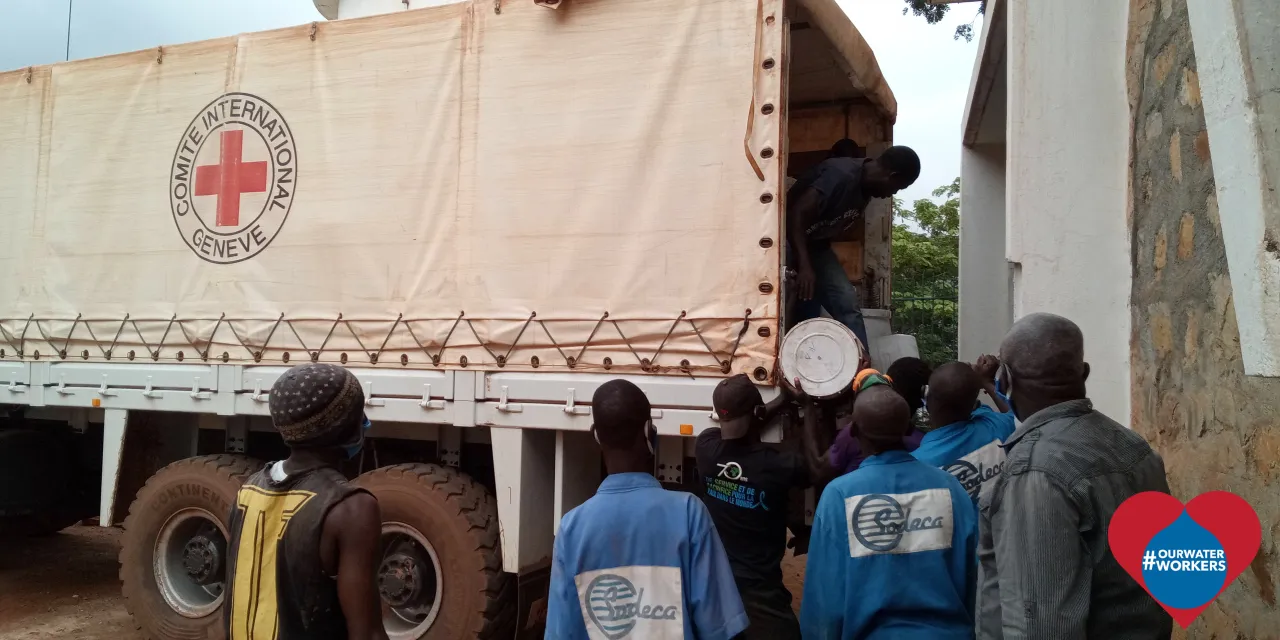
Bangui, Central African Republic. Water board workers offload chemicals imported from Cameroon. ICRC
Water utilities continue to serve the public, despite all obstacles
In countries hit by conflict, water workers play a vital role in preventing the spread of disease. Recognizing their efforts is an important first step in making everyone understand the importance of the water sector. Neither conflict nor COVID-19 should deny people the water they need for drinking, washing and cleaning. Water utilities and their staff must be allowed to get on with their duties.
COVID-19 will not be the last public health emergency. We must act today to prepare for tomorrow.
For more information, please read the World leaders' Call to Action on COVID-19
As well, download this pdf: Mitigating the socio-economic impacts on the Water, Sanitation and Hygiene (WASH) Sector
In response to the campaign initiated by Global Water Intelligence (GWI) entitled #ourwaterworkers, the ICRC collected testimonies from our local partners – water supply utilities – in several of the contexts that we work in. More on the GWI campaign.

